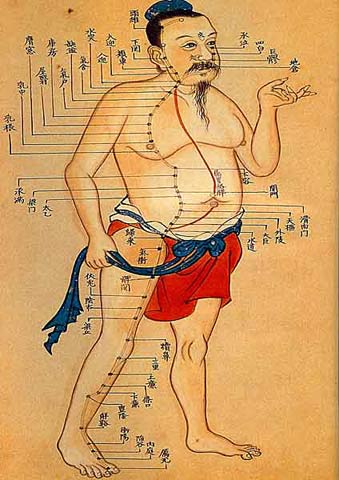You are probably wondering why we have a fairly dominant link to Traditional Chinese Medicine (TCM) on our website, after all it is about Feng Shui... However, Feng Shui similar to TCM is about energy and both share a fair similar philosophies, ideas and systems. For example the flow in energy is as relevant to a room and its harmony as it is to a body and its health. Similarities for example can be found in the way energy flows through a room or flows through a body, as described and used in acupuncture.
With this in mind, here is a short summary on what Traditional Chinese Medicine is about:
TCM - Traditional Chinese Medicine
 What is Chinese medicine?
What is Chinese medicine?
Taoism is the indigenous belief system of China with a unbroken history of over 4.000 years. Taoists fulfilled roles similar to that of today's scientists, philosophers, doctors and priests today. A lot of the ancient Chinese thought has been influenced and developed by Taoism and for example found its way into medicine, feng shui and body practices like Qi Gong and Tai Chi.
Chinese medicine is at its core based on knowledge gained through meditiation and observation. Combining this with anatomical knowledge and philosophical concepts evolved into a comprehensive medical system today now known as Traditional Chinese Medicine (TCM).
TCM includes herbal medicine, dietetics, acupuncture, massage, qi gong and meditation all which has been refined through millennia of clinical usage.
The theory behind Chinese medicines is that a living human body is imbued with energy (qi) which is fundamental for its healthy functioning.
The ease with which this circulates directly correlates to your sense of being fully alive. Illness and disease are considered to arise or remain because this circulation is impeded in some way. Thus Chinese medicine aims to help release these blockages in the tissues, energy flow, and mind that can cause daily life to become a burden rather than a pleasure.
One way to view the channel system of acupuncture is to compare it with the way rivers, streams, reservoirs and underground springs function in nature, which then become a metaphor for the functions and transportation of the vital substances (qi [chi], blood, essence, body fluids) throughout the body.
Feng Shui places the same importance on unimpeded energy flows - only the focus is in the environment rather than in the body.
The goal of the Chinese Medical practitiioner and the feng shui consultant is to arrive at solutions to balance and harmonise a person’s “temples” i.e. their body and home; by adjusting the quality and quantity of Qi, yin/yang and the five elements to ensure a person is able to reach and maintain a complete state of full vigour and purpose enabling them to thrive in the areas of their lives that are important to them.
So what we can learn from Chinese Medicine and for example the field of acupuncture is a great enhancement to the understanding of energy flows analyzed and harmonized in Feng Shui.
In our section "The Basics" you will find more details on subjects like:
- Qi (Chi)
- Five Phases (5 Elements)
as well as other basic concepts helpful in understanding Feng Shui.
|
This article is based on the article Traditional Chinese Medicine from the free encyclopedia Wikipedia and it licensed under the double licence of GNU Free Documentation License und Creative Commons CC-BY-SA 3.0 Unported. On Wikipedia a list of authors for this article is available. This article has been adjusted and extended for the use on this website. |


